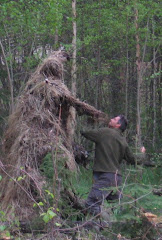 Each year, a vaccine is produced to combat seasonal influenza. The most likely strains are assembled and downtrodden. When administered, your immune system fights this weak version theoretically building the antibodies necessary to fight the strain. Study after study shows the flu vaccine reduces your chance of dying of influenza by 50 percent. Seems irrefutable.
Each year, a vaccine is produced to combat seasonal influenza. The most likely strains are assembled and downtrodden. When administered, your immune system fights this weak version theoretically building the antibodies necessary to fight the strain. Study after study shows the flu vaccine reduces your chance of dying of influenza by 50 percent. Seems irrefutable.The problem with these studies is that they measure people who chose to get the vaccine against people who don't. People who chose to get vaccinated are by definition concerned with their heath and more likely to take care of themselves. In the United States where vaccines are paid for by heath insurers, these studies are splitting the two groups into income brackets which naturally demarcate health. In other words, the studies compare healthy people to unhealthier people. You would think that any study worth its salt would eliminate this obvious problem by doing double blind experiments with vaccines versus placebos. But because the vaccine is presumed to work, it's considered unethical to give some a vaccine and others a placebo!
Some have challenged the results of this circular logic. In 2004, Lisa Jackson, a researcher with Group Heath Research Center in Seatle, studied medical histories of 72,000 people aged 65 and older. She found that outside of flu season, the baseline risk of death was 60 percent higher for the those that did not get flu shots.
This confirms the so-called "healthy user effect" demonstrating that healthier people tended to get the flu shot. In fact, the degree that they were healthier accounts for all of the supposed efficacy of the flu vaccine studies!
When Jackson presented these results to the Journal of the American Medical Association, they were rejected on the grounds that the results were akin to "suggesting the earth was flat." Other evidence is just as confounding. For example, just 30 years ago, few to none of people over 65 got a seasonal flu vaccine. Today nearly 75 percent get vaccinated, yet we don't see a decrease in influenza deaths to any degree that would indicate that the vaccine works. These obvious facts contravene sacred beliefs and are summarily ignored. It's possible that flu strains become have more infectious and lethal over that period and that lethality has exactly matched increasing rates of vaccinations but there is no evidence to support that claim. What seems most likely stems from the mechanics of the vaccine itself: those with good immune systems respond well to both the vaccine and the flu. Or more simply, the vaccine does nothing.
If a drug statistically appears to do nothing, then I will skip a step and not take it!
Important Post Script: I do not count myself among those who believe that certain vaccines cause autism or any number of other scientifically untenable claims.



8 comments:
Very good.
Definitely something to think on. Certainly more study needs to be done. But there is that whole ethical conundrum. Because vaccines do work it is assumed that the flu vaccine works, and because flu kills they won't let you screw around with placebos. Very hard to test things.
The only real way to do so is with epidemiology.
Compounding the problem is that no one really knows how many people actually die from the flu, because no one really checks! If you die from a flu-like disease during flu season, then they just assume you have the flu - very few people are actually tested. Add in the fact that secondary infections often pull the trigger and the expense of keeping records, it's not hard to see that the number of deaths due to flu are at best a handwave.
Until this year, that is, what with the elevated ICU cases and ILI reports spooking generally everyone (well, some have panicked whilst others yawn). But a single year of good records aren't enough to actually determine anything. If the incidence rate of flu decreases in a few months back to normal (for the flu season), will that be because the vaccines are doing their job, or because the pandemic flu has run its course? Not enough data to tell. Well, maybe a really clever epidemiologist could determine something from the data, but I wouldn't count on it.
One thing I would counsel, concerning the paper mentioned. The reasons stated why the paper was rejected are unfortunate, but in the current climate of anti-vax nonsense this paper might've seemed too crankish. For whatever reasons, the paper wasn't subjected to an honest peer review. This doesn't mean the paper is wrong, but it does mean that it most likely wasn't subjected to very much critical scrutiny. It may have glaring methodological flaws, the assumptions may be in error, there could be errors in interpretation of the results.
Maybe this paper was subjected to that scrutiny, but you don't point to any criticism of it so I'm assuming there wasn't any. Also, I'm not aware of the Group Health Research Center. For all I know, they could be like the Heartland institute.
I'll investigate some of this later and post on it. Definitely interesting.
Starcat you raise an excellent point about peer review scrutiny. The paper in question was eventually published in 2006 in International Journal of Epidemiology
Further study of the years 1968 and 1997 shows the formulation of the seasonal vaccine completely mismatched the predominant strain that infected people. Yet influenza deaths didn't reflect that. These years reflect the neutral effect of the vaccine.
In reference to the ethical dilemma associated with performing blind trials, the benign effects of the vaccine mismatch for 2 different years ought to demonstrate these fears are misplaced.
Bill Sardi has written a couple of short articles on the vaccination issue. This most recent note is titled "Flu Season Has Peaked; Vaccination Would Only Reduce Number of Infected Americans By 6 Percent; Young Children Would Receive No Benefit"... and this based on the presumption that flu vaccinations work as advertised.
You didn't provide a link, so I went trawling for Mr Sardi.
I found this page:
http://www.lewrockwell.com/sardi/sardi119.html
Item 4: Mercury scaring over adjuvants.
Item 5: increased risk of autism in younguns. Shows up in 7, 8
He's an antivaxxer.
Reading around, I can only assume that, at least when it comes to vaccines, he's a nut-bar.
Why swine flu did not end when he thought it did:
http://www.cdc.gov/flu/weekly/
that's right, two extra months of data.
He is right that this flu is not extra deadly. But he's completely ignoring the fact that it is killing the young and not the near-dead elderly as per usual.
Okay, so I found the page you wanted to link to:
http://www.lewrockwell.com/sardi/sardi131.html
From the abstract for the paper he links to:
"We use data on confirmed cases of pandemic influenza A(H1N1), disseminated by the United States Centers for Disease Control and Prevention(US CDC), to fit the parameters of a seasonally forced Susceptible, Infective, Recovered (SIR) model."
Notice the word "seasonally".
The authors are assuming that the disease will act like seasonal flu, and fit a sutiable harmonic model to it. That part of the paper looked pretty good. I even hope they're right. I also agree that for many, if not most, the vaccine will be too late to do any good.
But they might not be right, and seasonal might not be the pattern for this flu. It's already on a second peak. Who knows if there will be a third, or if there won't be a nice peak?
It can't hurt to get the vaccine, assuming there is enough to go around. And there is preliminary evidence that wide-spread resistance slows down the mutation rate of the virus. Also, a few thousand lives saved is not insignificant, especially if it involves someone you know. It seems quite callous to counsel people against vaccination, regardless of how you feel about it personally.
It can't hurt to get the vaccine, assuming there is enough to go around.
The vaccine isn't free.
The harm is the opportunity cost of what might have been purchased with my money if it weren't being flushed right down the vein.
Post a Comment